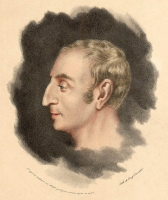| Claude Henri de Rouvroy, comte de Saint-Simon | |
| 勞德·昂列·聖西門 | |
| | |
勞德·昂列·聖西門(Claude Henri de Rouvroy, comte de Saint-Simon,常簡稱為Henri de Saint-Simon ,1760年10月17日 - 1825年5月19日)是法國哲學家、經濟學家、空想社會主義者。與實證主義創始人奧古斯特·孔德相熟,曾聘其為秘書。
聖西門出身貴族,曾參加法國大革命,還參加過北美獨立戰爭。他抨擊資本主義社會,致力於設計一種新的社會制度,花掉他的全部産。在他所設想的社會中,人人勞動,沒有不勞而,沒有剝削、沒有壓迫。
出處
- ^ Horowitz, Irving Louis, Veblen's Century: A Collective Portrait (2002), p142
Claude Henri de Rouvroy, comte de Saint-Simon, often referred to as Henri de Saint-Simon (French: [ɑ̃ʁi də sɛ̃ simɔ̃]; 17 October 1760 – 19 May 1825), was a French political, economic and socialist theorist and businessman whose thought had a substantial influence on politics, economics, sociology and the philosophy of science.
Saint-Simon created a political and economic ideology known as Saint-Simonianism that claimed that the needs of an industrial class, which he also referred to as the working class, needed to be recognized and fulfilled to have an effective society and an efficient economy. Unlike conceptions within industrializing societies of a working class being manual labourers alone, Saint-Simon's late-18th century conception of this class included all people engaged in productive work that contributed to society such as businesspeople, managers, scientists and bankers, along with manual labourers, amongst others.
Saint-Simon said the primary threat to the needs of the industrial class was another class he referred to as the idling class, that included able people who preferred to be parasitic and benefit from the work of others while seeking to avoid doing work. Saint-Simon stressed the need for recognition of the merit of the individual and the need for hierarchy of merit in society and in the economy such as society having hierarchical merit-based organizations of managers and scientists to be the decision-makers in government. Saint-Simon strongly criticized any expansion of government intervention into the economy beyond ensuring no hindrances to productive work and reducing idleness in society, regarding intervention beyond these as too intrusive.
Saint Simon's conceptual recognition of broad socio-economic contribution, and his Enlightenment valorization of scientific knowledge, soon inspired and influenced utopian socialism, liberal political theorist John Stuart Mill, anarchism through its founder Pierre-Joseph Proudhon who was inspired by Saint-Simon's thought and Marxism with Karl Marx and Friedrich Engels identifying Saint-Simon as an inspiration to their ideas and classifying him among the utopian socialists. Saint-Simon's views also influenced 20th century sociologist and economist Thorstein Veblen, including Veblen's creation of institutional economics that has included prominent economists as adherents.
